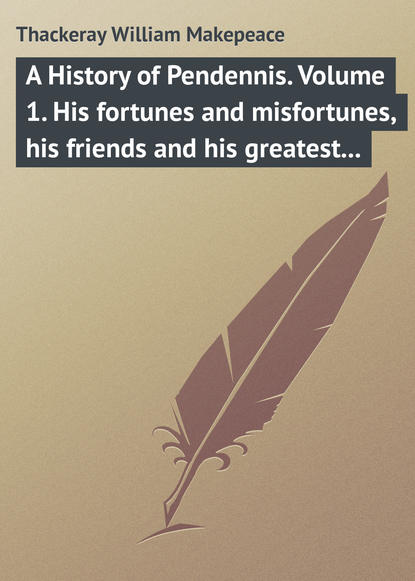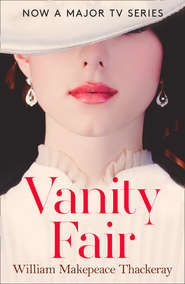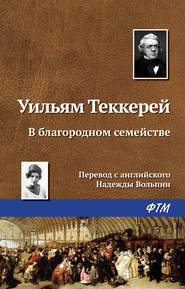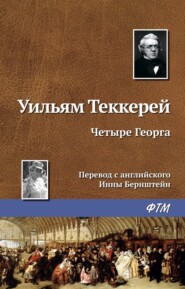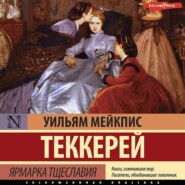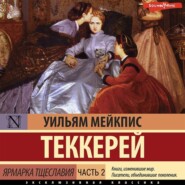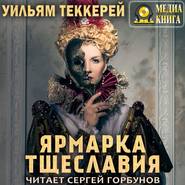По всем вопросам обращайтесь на: info@litportal.ru
(©) 2003-2024.
✖
A History of Pendennis. Volume 1. His fortunes and misfortunes, his friends and his greatest enemy
Настройки чтения
Размер шрифта
Высота строк
Поля
"High fellers, I tell you – the young one related to all the nobility," said the publisher; and both ran forward, smiling and bowing, to greet almost as great personages as the young lord – no less characters, indeed, than the great Mr. Wenham and the great Mr. Wagg, who were now announced.
Mr. Wenham entered, wearing the usual demure look and stealthy smile with which he commonly surveyed the tips of his neat little shining boots, and which he but seldom brought to bear upon the person who addressed him. Wagg's white waistcoat, spread out, on the contrary, with profuse brilliancy; his burly, red face shone resplendent over it, lighted up with the thoughts of good jokes and a good dinner. He liked to make his entrée into a drawing-room with a laugh, and, when he went away at night, to leave a joke exploding behind him. No personal calamities or distresses (of which that humorist had his share in common with the unjocular part of mankind) could altogether keep his humor down. Whatever his griefs might be, the thought of a dinner rallied his great soul; and when he saw a lord, he saluted him with a pun.
Wenham went up, then, with a smug smile and whisper, to Mrs. Bungay, and looked at her from under his eyes, and showed her the tips of his shoes. Wagg said she looked charming, and pushed on straight at the young nobleman, whom he called Pop; and to whom he instantly related a funny story, seasoned with what the French call gros sel. He was delighted to see Pen, too, and shook hands with him, and slapped him on the back cordially; for he was full of spirits and good humor. And he talked in a loud voice about their last place and occasion of meeting at Baymouth; and asked how their friends of Clavering Park were, and whether Sir Francis was not coming to London for the season; and whether Pen had been to see Lady Rockminster, who had arrived – fine old lady, Lady Rockminster! These remarks Wagg made not for Pen's ear so much as for the edification of the company, whom he was glad to inform that he paid visits to gentlemen's country seats, and was on intimate terms with the nobility.
Wenham also shook hands with our young friend – all of which scenes Mrs. Bungay remarked with respectful pleasure, and communicated her ideas to Bungay, afterward, regarding the importance of Mr. Pendennis – ideas by which Pen profited much more than he was aware.
Pen, who had read, and rather admired some of her works (and expected to find in Miss Bunion a person somewhat resembling her own description of herself in the "Passion-Flower," in which she stated that her youth resembled —
"A violet, shrinking meanly
When blows the March wind keenly
A timid fawn, on wild-wood lawn,
Where oak-boughs rustle greenly – "
and that her maturer beauty was something very different, certainly, to the artless loveliness of her prime, but still exceedingly captivating and striking), beheld, rather to his surprise and amusement, a large and bony woman in a crumpled satin dress, who came creaking into the room with a step as heavy as a grenadier's. Wagg instantly noted the straw which she brought in at the rumpled skirt of her dress, and would have stooped to pick it up: but Miss Bunion disarmed all criticism by observing this ornament herself, and, putting her own large foot upon it, so as to separate it from her robe, she stopped and picked up the straw, saying to Mrs. Bungay, that she was very sorry to be a little late, but that the omnibus was very slow, and what a comfort it was to get a ride all the way from Brompton for sixpence. Nobody laughed at the poetess's speech, it was uttered so simply. Indeed, the worthy woman had not the least notion of being ashamed of an action incidental upon her poverty.
"Is that 'Passion-Flowers?'" Pen said to Wenham, by whom he was standing. "Why, her picture in the volume represents her as a very well-looking young woman."
"You know passion-flowers, like all others, will run to seed," Wenham said; "Miss Bunion's portrait was probably painted some years ago."
"Well, I like her for not being ashamed of her poverty."
"So do I," said Mr. Wenham, who would have starved rather than have come to dinner in an omnibus, "but I don't think that she need flourish the straw about, do you, Mr. Pendennis? My dear Miss Bunion, how do you do? I was in a great lady's drawing-room this morning, and every body was charmed with your new volume. Those lines on the christening of Lady Fanny Fantail brought tears into the Duchess's eyes. I said that I thought I should have the pleasure of meeting you to-day, and she begged me to thank you, and say how greatly she was pleased."
This history, told in a bland, smiling manner, of a Duchess whom Wenham had met that very morning, too, quite put poor Wagg's dowager and baronet out of court, and placed Wenham beyond Wagg as a man of fashion. Wenham kept this inestimable advantage, and having the conversation to himself, ran on with a number of anecdotes regarding the aristocracy. He tried to bring Mr. Popjoy into the conversation by making appeals to him, and saying, "I was telling your father this morning," or, "I think you were present at W. House the other night when the Duke said so and so," but Mr. Popjoy would not gratify him by joining in the talk, preferring to fall back into the window recess with Mrs. Bungay, and watch the cabs that drove up to the opposite door. At least, if he would not talk, the hostess hoped that those odious Bacons would see how she had secured the noble Percy Popjoy for her party.
And now the bell of Saint Paul's tolled half an hour later than that for which Mr. Bungay had invited his party, and it was complete with the exception of two guests, who at last made their appearance, and in whom Pen was pleased to recognize Captain and Mrs. Shandon.
When these two had made their greetings to the master and mistress of the house, and exchanged nods of more or less recognition with most of the people present, Pen and Warrington went up and shook hands very warmly with Mrs. Shandon, who, perhaps was affected to meet them, and think where it was she had seen them but a few days before. Shandon was brushed up, and looked pretty smart, in a red velvet waistcoat, and a frill, into which his wife had stuck her best brooch. In spite of Mrs. Bungay's kindness, perhaps in consequence of it, Mrs. Shandon felt great terror and timidity in approaching her: indeed, she was more awful than ever in her red satin and bird of paradise, and it was not until she had asked in her great voice about the dear little gurl, that the latter was somewhat encouraged, and ventured to speak.
"Nice-looking woman," Popjoy whispered to Warrington. "Do introduce me to Captain Shandon, Warrington. I'm told he's a tremendous clever fellow; and, dammy, I adore intellect, by Jove I do!" This was the truth: Heaven had not endowed young Mr. Popjoy with much intellect of his own, but had given him a generous faculty for admiring, if not for appreciating, the intellect of others. "And introduce me to Miss Bunion. I'm told she's very clever too. She's rum to look at, certainly, but that don't matter. Dammy, I consider myself a literary man, and I wish to know all the clever fellows." So Mr. Popjoy and Mr. Shandon had the pleasure of becoming acquainted with one another; and now the doors of the adjoining dining-room being flung open, the party entered and took their seats at table. Pen found himself next to Bunion on one side, and to Mr. Wagg – the truth is, Wagg fled alarmed from the vacant place by the poetess, and Pen was compelled to take it.
The gifted being did not talk much during dinner, but Pen remarked that she ate, with a vast appetite, and never refused any of the supplies of wine which were offered to her by the butler. Indeed, Miss Bunion having considered Mr. Pendennis for a minute, who gave himself rather grand airs, and who was attired in an extremely fashionable style, with his very best chains, shirt studs, and cambric fronts, was set down, and not without reason, as a prig by the poetess; who thought it was much better to attend to her dinner than to take any notice of him. She told him as much in after days, with her usual candor. "I took you for one of the little Mayfair dandies," she said to Pen. "You looked as solemn as a little undertaker; and as I disliked beyond measure, the odious creature who was on the other side of me, I thought it was best to eat my dinner and hold my tongue."
"And you did both very well, my dear Miss Bunion," Pen said, with a laugh.
"Well, so I do, but I intend to talk to you the next time a great deal: for you are neither so solemn, nor so stupid, nor so pert as you look."
"Ah, Miss Bunion, how I pine for that 'next time' to come," Pen said, with an air of comical gallantry. But we must return to the day, and the dinner at Paternoster Row.
The repast was of the richest description – "What I call of the florid Gothic style," Wagg whispered to Pen, who sate beside the humorist, in his side-wing voice. The men in creaking shoes and Berlin gloves were numerous and solemn, carrying on rapid conversations behind the guests, as they moved to and fro with the dishes. Doolan called out, "Waither," to one of them, and blushed when he thought of his blunder. Mrs. Bungay's own footboy was lost amidst those large and black-coated attendants.
"Look at that very bow-windowed man," Wagg said. "He's an undertaker in Amen Corner, and attends funerals and dinners. Cold meat and hot, don't you perceive? He's the sham butler here, and I observe, my dear Mr. Pendennis, as you will through life, that wherever there is a sham butler at a London dinner there is sham wine – this sherry is filthy. Bungay, my boy, where did you get this delicious brown sherry?"
"I'm glad you like it, Mr. Wagg; glass with you," said the publisher. "It's some I got from Alderman Benning's store, and gave a good figure for it, I can tell you. Mr. Pendennis, will you join us? Your 'ealth, gentlemen."
"The old rogue, where does he expect to go to? It came from the public house," Wagg said. "It requires two men to carry off that sherry, 'tis so uncommonly strong. I wish I had a bottle of old Steyne's wine here, Pendennis: your uncle and I have had many a one. He sends it about to people where he is in the habit of dining. I remember at poor Rawdon Crawley's, Sir Pitt Crawley's brother – he was Governor of Coventry Island – Steyne's chef always came in the morning, and the butler arrived with the champagne from Gaunt House, in the ice-pails ready."
"How good this is!" said Popjoy, good-naturedly. You must have a cordon bleu in your kitchen."
"O, yes," Mrs. Bungay said, thinking he spoke of a jack-chain very likely.
"I mean a French chef," said the polite guest.
"O, yes, your lordship," again said the lady.
"Does your artist say he's a Frenchman, Mrs. B.?" called out Wagg.
"Well, I'm sure I don't know," answered the publisher's lady.
"Because, if he does, he's a quizzin yer," cried Mr. Wagg; but nobody saw the pun, which disconcerted somewhat the bashful punster. "The dinner is from Grigg's, in St. Paul's churchyard; so is Bacon's," he whispered Pen. "Bungay writes to give half-a-crown a head more than Bacon, – so does Bacon. They would poison each other's ices if they could get near them; and as for the made-dishes – they are poison. This – hum – ha – this Brimborion a la Sévigné is delicious, Mrs. B.," he said, helping himself to a dish which the undertaker handed to him.
"Well, I'm glad you like it," Mrs. Bungay answered, blushing, and not knowing whether the name of the dish was actually that which Wagg gave to it, but dimly conscious that that individual was quizzing her. Accordingly she hated Mr. Wagg with female ardor; and would have deposed him from his command over Mr. Bungay's periodical, but that his name was great in the trade, and his reputation in the land considerable.
By the displacement of persons, Warrington had found himself on the right hand of Mrs. Shandon, who sate in plain black silk and faded ornaments by the side of the florid publisher. The sad smile of the lady moved his rough heart to pity. Nobody seemed to interest himself about her: she sate looking at her husband, who himself seemed rather abashed in the presence of some of the company. Wenham and Wagg both knew him and his circumstances. He had worked with the latter, and was immeasurably his superior in wit, genius, and acquirement; but Wagg's star was brilliant in the world, and poor Shandon was unknown there. He could not speak before the noisy talk of the coarser and more successful man; but drank his wine in silence, and as much of it as the people would give him. He was under surveillance. Bungay had warned the undertaker not to fill the captain's glass too often or too full. It was a melancholy precaution that, and the more melancholy that it was necessary. Mrs. Shandon, too, cast alarmed glances across the table to see that her husband did not exceed.
Abashed by the failure of his first pun, for he was impudent and easily disconcerted, Wagg kept his conversation pretty much to Pen during the rest of dinner, and of course chiefly spoke about their neighbors. "This is one of Bungay's grand field-days," he said. "We are all Bungavians here. – Did you read Popjoy's novel? It was an old magazine story written by poor Buzzard years ago, and forgotten here until Mr. Trotter (that is Trotter with the large shirt collar) fished it out, and bethought him that it was applicable to the late elopement; so Bob wrote a few chapters apropos– Popjoy permitted the use of his name, and I dare say supplied a page here and there – and 'Desperation, or, the Fugitive Duchess' made its appearance. The great fun is to examine Popjoy about his own work, of which he doesn't know a word. – I say, Popjoy, what a capital passage that is in Volume Three – where the cardinal in disguise, after being converted by the Bishop of London, proposes marriage to the duchess's daughter."
"Glad you like it," Popjoy answered; "it's a favorite bit of my own."
"There's no such thing in the whole book," whispered Wagg to Pen. "Invented it myself. Gad! it wouldn't be a bad plot for a high-church novel."
"I remember poor Byron, Hobhouse, Trelawney, and myself, dining with Cardinal Mezzocaldo, at Rome," Captain Sumph began, "and we had some Orvieto wine for dinner, which Byron liked very much. And I remember how the cardinal regretted that he was a single man. We went to Civita Vecchia two days afterward where Byron's yacht was – and, by Jove, the cardinal died within three weeks; and Byron was very sorry, for he rather liked him."
"A devilish interesting story, Sumph, indeed," Wagg said.
"You should publish some of those stories, Captain Sumph, you really should. Such a volume would make our friend Bungay's fortune," Shandon said.
"Why don't you ask Sumph to publish 'em in your new paper – the what-d'ye-call'em? – hay, Shandon," bawled out Wagg.
"Why don't you ask him to publish 'em in your old magazine, the Thingumbob?" Shandon replied.
"Is there going to be a new paper!" asked Wenham, who knew perfectly well; but was ashamed of his connection with the press.
"Bungay going to bring out a paper?" cried Popjoy, who, on the contrary, was proud of his literary reputation and acquaintances. "You must employ me. Mrs. Bungay, use your influence with him, and make him employ me. Prose or verse – what shall it be? Novels, poems, travels, or leading articles, begad. Any thing or every thing – only let Bungay pay me, and I'm ready – I am now, my dear Mrs. Bungay, begad now."
"It's to be called the 'Small Beer Chronicle,'" growled Wagg, "and little Popjoy is to be engaged for the infantine department."
"It is to be called the 'Pall-Mall Gazette,' sir, and we shall be very happy to have you with us," Shandon said.
"'Pall-Mall Gazette' – why 'Pall-Mall Gazette?'" asked Wagg.
"Because the editor was born at Dublin, the sub-editor at Cork, because the proprietor lives in Paternoster Row, and the paper is published in Catherine-street, Strand. Won't that reason suffice you, Wagg?" Shandon said; he was getting rather angry. "Every thing must have a name. My dog Ponto has got a name. You've got a name, and a name which you deserve, more or less, bedad. Why d'ye grudge the name to our paper?"
"By any other name it would smell as sweet," said Wagg.
"I'll have ye remember its name's not what-d'ye-call'em, Mr. Wagg," said Shandon. "You know its name well enough, and – and you know mine."





